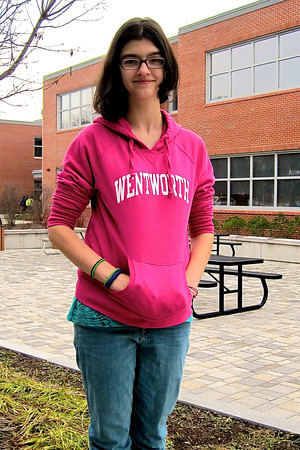Liz Morgan-DeLossa: From fencing I’ve learned about discipline and assertiveness
December 16, 2013

“What I like about fencing is that it builds up character and inner strength,” Morgan-DeLossa said.
Morgan-DeLossa won the Zeta Club tournament in 2011, placed eighth in Sword in the Snow in 2012 and placed sixth in the Junior Olympic Qualifiers November of 2013. She trains at Zeta Fencing Studio in Natick. Morgan-DeLossa takes classes twice a week, usually on Monday and Wednesday. Each class is one and a half hours. During school vacations, she goes four times a week.
Even though Morgan-DeLossa enjoys competing overall, she dislikes other competitors’ attitudes towards losing.
“Not enough studios and clubs teach their members to lose with grace. I’ve seen people throw temper tantrums on the strips when they lose, and honestly, it’s the world’s most annoying thing,” Morgan-DeLossa said.
Morgan-DeLossa reflected on what she has learned from fencing.
“From fencing I’ve learned about discipline and assertiveness. Fencing is like physical chess, teaching you to plan out your actions before you start,” Morgan-DeLossa said. “When I first joined fencing, I had low self-esteem. Now, my confidence has soared.”
She plans on continuing to fence for the next few years and possibly staying involved with the sport as an adult.
“I do see myself fencing throughout high school. I don’t know about college though. It depends on where I go because not all universities have fencing programs, and some are more serious than others. I may help referee at tournaments when I’m older, but it all depends on what I choose to do,” Morgan-DeLossa said.





![Last Wednesday, the Wayland School Committee gathered to discuss a number of topics regarding the health curriculum and Innovation Career Pathway course. Another large topic of conversation was the ways to potentially mitigate distracting cell phone usage. "These [phones] are going to distract your learning and social relationships," Superintendent David Fleishman said. "That's concrete right there."](https://waylandstudentpress.com/wp-content/uploads/2025/06/Screenshot-2025-06-04-at-9.49.31 PM-1200x886.png)



























![Troy Hoyt finishes the Boston Marathon, running for the Hoyt Foundation. T. Hoyt is the son of Hoyt Foundation CEO Russ Hoyt.
“[Running a marathon] might seem like a big thing, when it’s presented to you at first, but if you break it up and just keep telling yourself, “Yes, you can,” you can start chipping away at it. And before you know it, you’ll be running the whole 26 miles, and you won’t even think twice about it.” T. Hoyt said.](https://waylandstudentpress.com/wp-content/uploads/2025/04/C36E8761-1CBB-452E-9DF2-543EF7B1095E_1_105_c.jpeg)











































